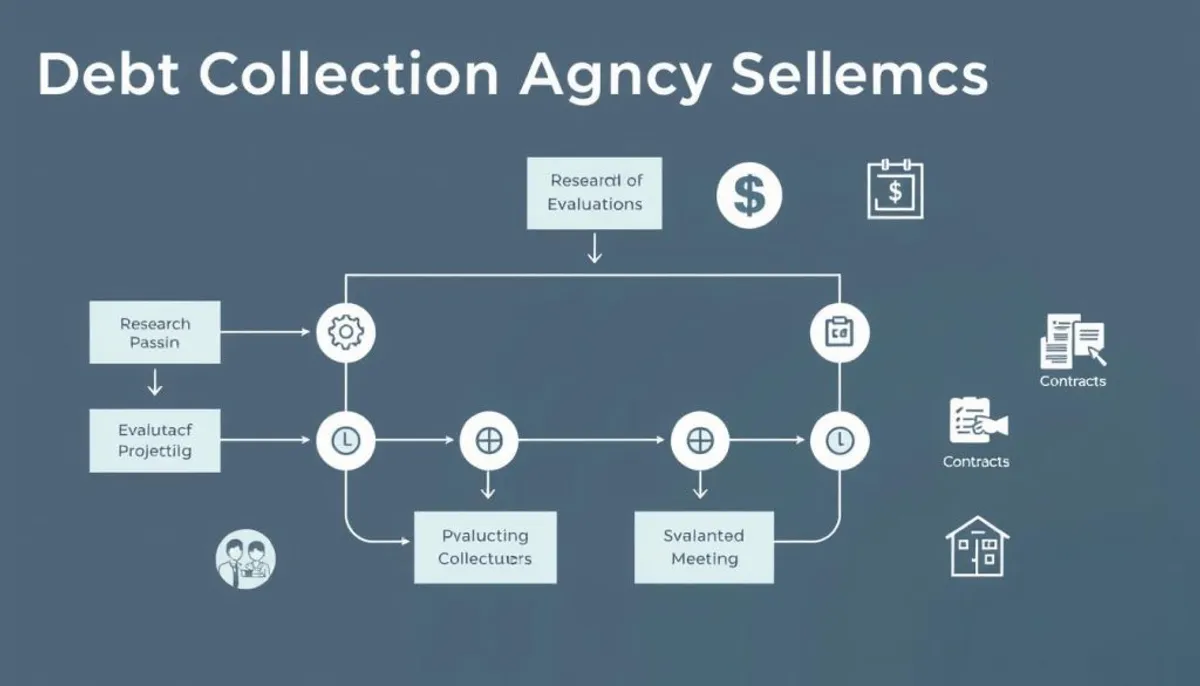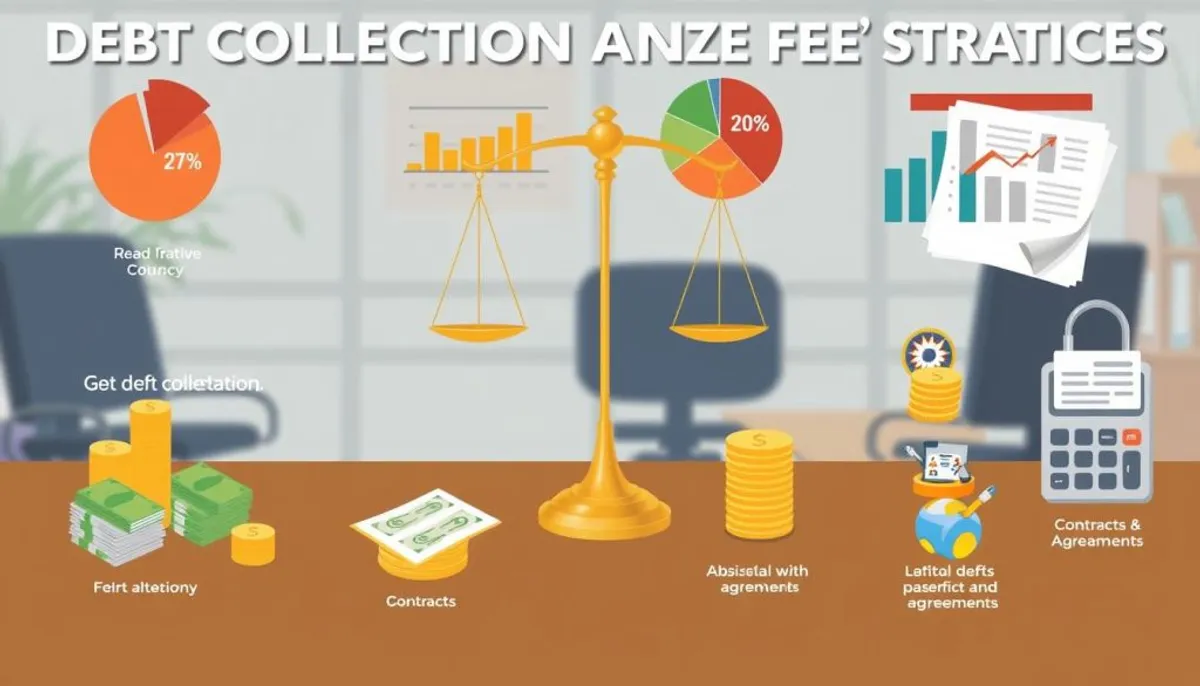Unpaid invoices can significantly impact your business’s financial health. Engaging a debt collection agency might be the most effective strategy. This guide will elucidate the process of selecting a debt collection agency and the advantages of debt recovery services.
Choosing the appropriate agency is paramount. It can expedite payment recovery and enhance your financial performance. We will guide you through the selection of a collection agency that aligns with your business requirements.

We will also introduce ti3, a contemporary debt recovery solution. It leverages automated systems and maintains client relationships. Our aim is to provide you with the necessary information to make an informed decision for your business’s benefit.
Key Takeaways
- Collection agencies operate on a contingency basis, charging only for successful recoveries
- Professional agencies can accelerate debt recovery and maximize returns
- Hiring an agency can be cost-effective, saving time and resources
- Agencies employ advanced tools for enhanced success rates
- Choose an agency with relevant industry experience
- Look for a licensed agency to ensure legal compliance
- Understand the agency’s fee structure before partnering
Understanding the Role of Debt Collection Agencies
Debt collection agencies are pivotal in aiding businesses in retrieving unpaid debts. They intervene when internal efforts to collect payments have reached a dead end. This exploration delves into the core functions of debt collection agencies and their indispensable role within the financial sphere.
What Debt Collection Agencies Do
These specialized entities focus on retrieving unpaid debts for corporations. They deploy skilled professionals who are well-versed in debt collection laws. Utilizing a variety of strategies, including phone calls, letters, and emails, they aim to reconnect with debtors. Notably, they also report delinquent accounts to credit bureaus, potentially affecting debtors’ credit scores.
Types of Debts Handled
Professional collection services tackle a broad spectrum of debts, encompassing:
- Credit card bills
- Personal loans
- Medical bills
- Utility payments
- Business-to-business debts
When to Consider Professional Collection Services
Businesses often seek out debt collection agencies after a period of three to six months without payment. These services leverage their expertise and specialized tools to enhance debt recovery rates. Operating on a commission basis, they charge between 25% to 50% of the recovered amount. It’s important to note that the Fair Debt Collection Practices Act (FDCPA) regulates the activities of debt collectors, safeguarding consumers from exploitative practices.
| Collection Agency Type | Description |
|---|---|
| First-party agencies | Handle early-stage delinquencies, focus on maintaining customer relationships |
| Third-party agencies | Independent firms hired to collect debts after extended delinquency |
| Debt buyers | Purchase delinquent debts at discounted rates from creditors or other agencies |
Benefits of Professional Debt Recovery Services
Engaging a debt collection agency offers significant benefits to businesses facing unpaid accounts. These professionals excel in understanding and adhering to complex debt collection laws. This includes compliance with the Fair Debt Collection Practices Act, reducing legal risks for businesses and enhancing recovery outcomes.
One of the primary benefits of debt collection agencies is their capacity to enhance cash flow. They employ proven protocols and persistent follow-up, leading to higher success rates than internal efforts. This efficiency results in faster payment collection, benefiting business operations significantly.
Professional debt recovery services also offer non-financial advantages. They utilize effective communication strategies, which help preserve customer relationships during the debt recovery process. This approach ensures positive interactions with clients, even in difficult circumstances.
- Higher recovery rates than in-house efforts
- Improved cash flow through efficient collection
- Preservation of customer relationships
- Compliance with debt collection laws
- Time and resource optimization for businesses
Outsourcing debt collection allows businesses to concentrate on their core functions, promoting growth and innovation. The cost-effectiveness of hiring a collection agency, often on a contingency basis, appeals to many companies looking to streamline their financial operations.
How to Hire a Debt Collection Agency
The process of selecting a debt collection agency is critical for businesses aiming to recover outstanding debts. A structured approach ensures the identification of a suitable partner for achieving financial objectives.
Assessing Your Collection Needs
Begin by examining the types and volume of debts you need to collect. This step narrows down the list to agencies that specialize in your specific needs. Consider the age and total value of debts to determine the most effective collection strategy.
Researching Potential Agencies
Utilize online resources, industry directories, and peer recommendations to compile a list of potential agencies. Focus on those with experience in your industry and a track record of success. It’s important to note that 40%-50% of debt collectors charge between 25% and 45% of the total debt amount for their services.
Evaluating Agency Credentials
Verify the licensing, bonding, and compliance with the Fair Debt Collection Practices Act when hiring a debt collection agency. Ensure they carry Errors and Omissions Insurance to safeguard against legal liabilities. These measures confirm the agency’s legal and ethical operation.

Reviewing Service Offerings
Analyze each agency’s debt collection strategies and fee structures. Many operate on a “No Collection – No Fee” model, charging a percentage of the collected amount. Others may offer flat fee structures for pre-collection services. Agencies employing skip tracing to locate debtors who have moved without notice are also worth considering.
| Service | Description | Typical Cost |
|---|---|---|
| Contingency Collection | Fee based on percentage of recovered debt | 25-45% of collected amount |
| Pre-Collection | Early intervention services | Flat fee (lower than contingency) |
| Skip Tracing | Locating debtors who have moved | Included in contingency or additional fee |
| Legal Action | Pursuing debts through court system | Varies, often higher than standard collection |
By meticulously evaluating collection agencies based on these criteria, you can choose a partner that aligns with your business needs and values.
Essential Legal Requirements and Compliance
Understanding the legal framework of debt collection is paramount for businesses. The core elements include collection agency licensing, FDCPA compliance, and debt collection regulations. These are the pillars of ethical and lawful practices within the industry.
Licensing Requirements
Collection agencies must secure proper licensing to operate legally. Approximately 30 states demand agencies to possess surety bonds before issuing collection licenses. This mandate ensures adherence to regulations and safeguards consumers.
FDCPA Compliance
The Fair Debt Collection Practices Act (FDCPA) imposes stringent guidelines on debt collectors. Agencies must follow these rules to safeguard debtors’ rights. Only 1.5% of U.S. debt collection agencies have achieved the Professional Practices Management System certification. This underscores the significance of selecting a compliant partner.
State-Specific Regulations
Debt collection regulations differ across states. Agencies must have a deep understanding of local laws where they operate. Top-tier agencies implement comprehensive compliance management systems. These include internal audits, training programs, and data security policies to fulfill these varied requirements.
| Compliance Area | Requirement |
|---|---|
| Licensing | State-specific, often requiring surety bonds |
| FDCPA | Federal law governing debt collection practices |
| State Laws | Vary by location, may be more stringent than federal |
| HIPAA | Required for medical debt collection |
Introducing ti3: A Modern Alternative to Traditional Collections
In today’s business environment, late payments are a major hurdle. With 89% of small-to-medium enterprises facing growth hurdles due to delayed payments, finding effective solutions is imperative. ti3 emerges as a pioneering platform, transforming debt collection.
Automated Payment Recovery System
ti3’s debt collection system is automated, streamlining the recovery process. This innovation tackles the issue of 65% of businesses dedicating 14 hours weekly to payment-related tasks. By automating reminders and escalations, ti3 liberates business owners’ time.
Client Relationship Preservation
ti3 diverges from traditional collection methods by prioritizing client relationships. This is vital, given that 25% of small businesses risk closure due to payment issues. ti3’s system ensures professional communication while recovering overdue payments, safeguarding long-term business ties.
Cost-Effective Solution
Small businesses invest about £5,000 annually in late payment recovery. ti3 offers a cost-effective alternative to traditional debt collection agencies. By eliminating the need for third-party involvement, businesses retain control over their accounts receivable, reducing expenses.
| Feature | Benefit |
|---|---|
| Automated Payment Recovery | Reduces administrative time by 14 hours per week |
| Client Relationship Preservation | Maintains business connections while recovering payments |
| Cost-Effective Solution | Saves £5,000 annually on debt recovery efforts |
Understanding Collection Agency Fees and Pricing
Collection agency fees are influenced by various elements. The primary pricing models include flat fees, contingency fees, and debt buying. Each model presents unique benefits and considerations for entities in need of debt recovery services.
Flat fees are initial charges incurred at the outset of the collection process. These can begin at $15 per account, ideal for handling numerous smaller cases. In contrast, contingency fees are percentages of the collected amount, ranging from 20% to 50%.

Debt buying involves agencies purchasing debts at a discounted rate, aiming to profit from collection efforts. This model transfers risk to the agency but may yield a lower immediate return for the creditor.
Several factors affect debt collection pricing structures:
- Age of the debt
- Average balance
- Volume of accounts
- Industry type
For instance, healthcare debts often come with lower contingency fees compared to property management debts. The debt’s age also plays a role, with older debts typically incurring higher fees due to increased collection difficulty.
| Claim Amount | Contingency Rate |
|---|---|
| $1,000 and under | 50% |
| $1,000 – $5,000 | 25% |
| $5,000 – $50,000 | 20% |
| $50,000 – $500,000 | 15% |
| Over $500,000 | 10% |
When choosing a collection agency, evaluate their success rates alongside their fee structure. A higher contingency rate might be justified if the agency shows superior recovery rates. It is crucial to understand all fees, commission rates, and additional costs before engaging an agency’s services.
Evaluating Agency Performance and Track Record
In the selection of a debt collection agency, a thorough assessment of performance and track record is imperative. This evaluation is critical to ensure collaboration with a firm capable of efficiently recovering debts. We will examine pivotal factors to consider when assessing collection agency performance.
Success Rate Metrics
Debt recovery success rates exhibit considerable variation among agencies. Agencies like Summit Account Resolution showcase a 34.8% recovery rate, with certain cases achieving up to 80%. PSI reports a 38% success rate, while Rocket Receivables claims to recover four times the industry average. These statistics offer invaluable insights into an agency’s efficacy.
Industry Experience
Seek agencies with profound experience in your specific industry. For instance, IC System boasts over 80 years of debt collection expertise. Agencies with industry-specific acumen comprehend unique challenges and can customize their strategies for enhanced outcomes.
Client References
Client references offer genuine insights into an agency’s performance. Rocket Receivables, for example, has served over 60,000 clients and collected more than $6 billion in the last decade. Such remarkable figures underscore their capabilities and client contentment.
| Agency | Recovery Rate | Experience | Clients Served |
|---|---|---|---|
| Summit Account Resolution | 34.8% (up to 80%) | Not specified | Not specified |
| PSI | 38% | Not specified | Not specified |
| Rocket Receivables | 4x industry average | 10+ years | 60,000+ |
| IC System | Not specified | 80+ years | Not specified |
Technology and Communication Standards
Modern debt collection agencies leverage advanced technology to enhance efficiency. It is imperative to assess their technological capabilities and communication standards when selecting an agency.
Reporting Capabilities
Leading agencies provide detailed reports on their collection efforts. Seek those offering real-time updates and in-depth analytics. Such reports facilitate the monitoring of progress and enable strategic decisions regarding your accounts.
Digital Collection Tools
Agencies equipped with state-of-the-art digital tools generally outperform others. These tools encompass skip tracing software, automated communication systems, and data analytics platforms. They significantly streamline the collection process, thus elevating recovery rates.
Client Portal Features
A sophisticated client portal is pivotal in maintaining superior client communication standards. It should provide:
- Real-time access to account information
- Activity logs
- Performance metrics
- Integration with your existing systems
Let’s compare the features of traditional and modern debt collection agencies:
| Feature | Traditional Agency | Modern Agency |
|---|---|---|
| Reporting | Monthly paper reports | Real-time digital updates |
| Collection Tools | Manual processes | AI-powered digital tools |
| Client Portal | Limited or none | Comprehensive, 24/7 access |
| Data Integration | Manual data entry | Seamless system integration |
By focusing on agencies with cutting-edge technology and robust communication standards, you position yourself for more effective debt recovery and smoother operations.
Conclusion
Hiring a debt collection agency can be transformative for businesses facing unpaid debts. With Americans owing $17.80 trillion in consumer debt, the need for professional services is evident. These agencies are adept at increasing collection rates while maintaining client relationships.
When choosing a debt recovery solution, focus on agencies with specialized knowledge and strong ratings from the Better Business Bureau. Ensure they comply with legal standards, such as the Fair Debt Collection Practices Act. Look for certifications from organizations like ACA International to guarantee quality service.
Assess the agency’s tools and methods, including skip tracing and digital communication. These can enhance debt recovery efficiency. It’s also crucial to review their insurance and fee structure to ensure a financially sound partnership.
Whether you prefer a traditional agency or a modern solution like ti3’s automated system, the right choice can safeguard your business’s financial health and customer ties. An informed decision will empower you to manage outstanding debts effectively, ensuring a steady cash flow.
RelatedRelated articles



